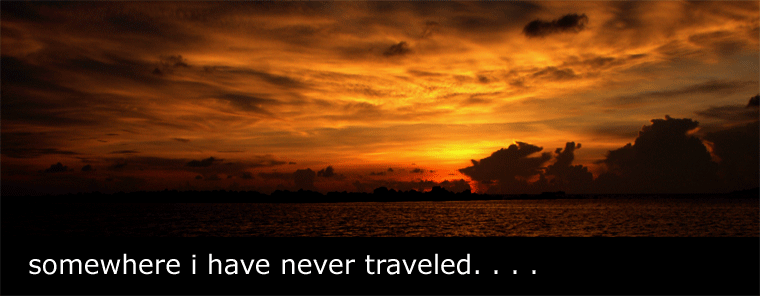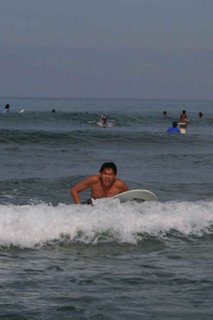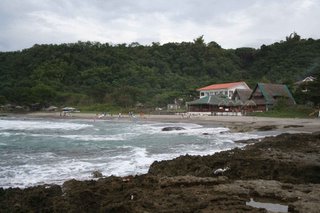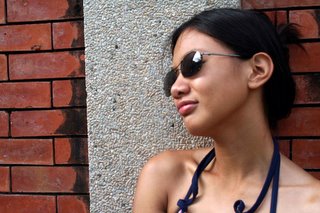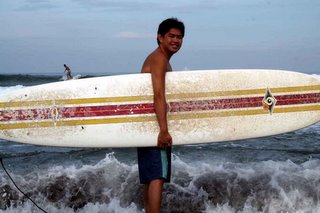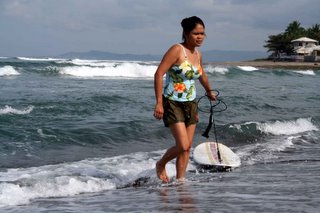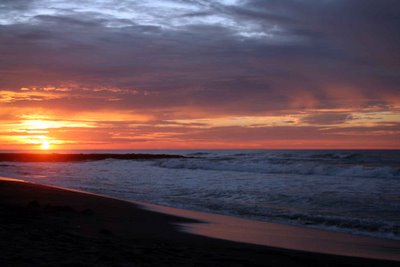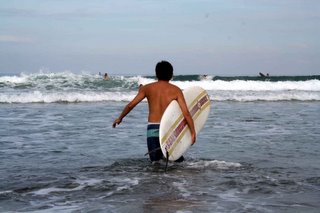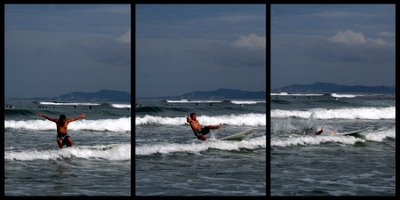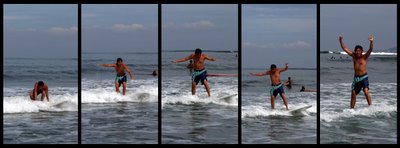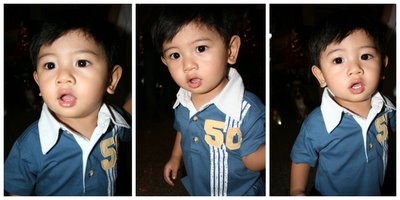I begin with a brief introduction.
Many people are surprised and even somewhat embarrassed for me when I tell them that I have never yet been to Boracay. Perhaps this was due to the fact that I had learned quite late that I am really a beach bum by way of preference in vacation destinations; and before I had the chance of taking the plunge into the blue waters of Boracay, nearer and much accessible beaches seemed to be a more logical choice: Anilao, Calatagan, Nasugbu, Matabungkay, Puerto Galera. These were often short weekend trips, or made between semesters in law school, without much expense or fanfare. The sun was good, I thought, the sand was fine enough, and the company even better— Boracay could be put off to some other time.
As with everything else in my life after the bar, therefore, I finally had time to get around doing the things which I had been putting off for so long. I had just come from a week in Bohol and Davao with my family, and the next big vacation was, of course, finally, Boracay.
The plans were straightforward enough: five days, four nights, Boracay Island, November 24-28, to coincide with the long weekend of Bonifacio Day. Kristine would arrange the accommodations, and since I had frequent flyer miles with Philippine Airlines, I would take care of my own transportation and fly separately. I thought about the arrangement, and found both the accommodations and the schedule agreeable. However, knowing that only four of us were confirmed for the trip— myself, Kristine, Paolo and their friend Jason who was flying in from California— I had my doubts as to the length of time we were to spend there.
Date: Sun, 23 Oct 2005 20:13:08 -0700 (PDT)
From:"Peej Bernardo"
Subject: Re: Progress on Boracay [Fwd: BILLING STATEMENT & PAYMENT INSTRUCTIONS]
To: "Tin Reyes"
Kristine, I'm still in Davao. I will be flying back tonight on the six p.m. flight.
I'm still okay with your proposed schedule, although I thought: maybe five days will be too long for me? I guess it's fine with you, since you can just spend idle time cuddling with Paolo, or something [eeep!], whereas I'd be left contemplating suicide at the edge of the water!
Seriously, though, I'm concerned that I might just get bored by the 4th or 5th day. I mean, it is five friggin' days on a small island. One can only stay drunk for so long!
Thus far my thoughts.
peej b.
This was an email that, coming home from the trip, I would never hear the end of. It was a good thing that Kristine had the good sense to dismiss my concerns and reassure me that five days would, in fact, be barely sufficient to take-in the entire Bora experience. She would be right, of course, because having just experienced it for myself, the island, I found, was the ultimate natural opiate. One could not get enough of it.
DAY ONE [November 24]: Resetting Clocks
First Impressions
The 24th of November was a very long day for me. I had only slept for two hours before being roused for my eight-fifteen flight to Caticlan. I had originally been booked to fly with Philippine Airlines, at nine-thirty later that morning, landing in Kalibo a little over an hour later. Thankfully, however, I was not able to get a booking for my return flight home on the 28th, and prompted by a friend’s suggestion that I take one of the local airlines which landed in Caticlan, I was constrained to change my booking for this earlier flight, taking me directly beside the island and thereby saving me two hours of inconvenient overland travel.
I arrived at the Manila Domestic Airport a quarter past seven in the morning. Breezing through check-in, I sat in the rather large and noisy pre-departure area with my camera bag and IPod in tow. So engrossed was I with tinkering with the gadget that I barely noticed Paolo, Kristine and Jason arriving some thirty minutes later and sitting at the first row of the hall, in front of me, to the right. Their flight would depart ten minutes before mine, and walking over to them, I felt my first surge of excitement at the prospect of the next five days.
 Sitting with them near the departure gate, I saw, through the large glass-paneled windows, the aircraft that we would probably be taking. I, of course, had issues with riding airplanes— more so, with those propeller-driven turboprop ones like the one I was going to take. It was only recently when this morbid fear of flying seized me— I never had issues when I was much younger— and I figured this was due to the natural recognition of mortality that dawns as one gets older, realizing, perhaps, that one is not as invincible as he thought he was. Dying in an airplane is terrible, I thought, because you absolutely had no control over your own survival: an airplane falls from the sky, you are surely dead; in a car accident or a boat collision, there still is a possibility of surviving.
Sitting with them near the departure gate, I saw, through the large glass-paneled windows, the aircraft that we would probably be taking. I, of course, had issues with riding airplanes— more so, with those propeller-driven turboprop ones like the one I was going to take. It was only recently when this morbid fear of flying seized me— I never had issues when I was much younger— and I figured this was due to the natural recognition of mortality that dawns as one gets older, realizing, perhaps, that one is not as invincible as he thought he was. Dying in an airplane is terrible, I thought, because you absolutely had no control over your own survival: an airplane falls from the sky, you are surely dead; in a car accident or a boat collision, there still is a possibility of surviving.
I tried to put these thoughts aside as I boarded the SeaAir Dornier DO-328, settling into seat 14A, right behind the left wing. It was a small aircraft: only around twenty people were in the cabin. The right side of the plane had two seats to a row, while the left side, a single column by the windows. An isle divided the two halves of the plane, leading directly to the pilot’s cockpit, whose door was open the whole time during the flight.
A moment later, the engines whirred to life, and after quickly taxiing to the main runway, rumbled down for a brisk take-off. I was surprised by the thrust that the engines generated, pushing me flat against my seat. We were airborne in an instant, and Manila drifted like a happy memory beneath me. We banked gently south, toward Boracay.
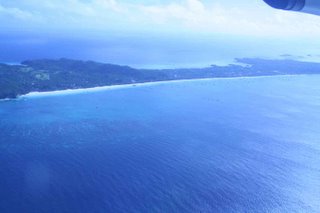 The IPod had helped me while away the thirty-five minute flight. No sooner had I started on one of the pre-programmed playlists that I saw outside my window what I figured to be the famous strip of beach, called the White Beach, that was characteristically Boracay.
The IPod had helped me while away the thirty-five minute flight. No sooner had I started on one of the pre-programmed playlists that I saw outside my window what I figured to be the famous strip of beach, called the White Beach, that was characteristically Boracay.
It was not an island in the middle of nowhere, I thought to myself. Neither was it circular as I had imagined, like those South Pacific islands I saw a lot in photographs. And the island was quite large; Boracay was not only a beach after all.
My thoughts were interrupted by the plane’s sudden landing— quite bumpy, if you ask me; but I was glad that I was on the ground alive. I deplaned to the deafening roar of the propellers still spinning, and found my group waiting in the arrival area of the Caticlan airport, filled now with people from both arriving flights.
We quickly retrieved our bags, registered with the tourist department, and found a forty-peso tricycle to take us to the Caticlan port for the ferry ride to the island, a mere three kilometers away.
One Giant Leap
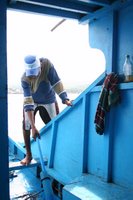 The ferry itself was quite large, with a capacity of about fifty people. There were a number of holidaymakers on the boat with us, but a greater number were locals bringing produce and other wares to the island. The ferry cut across the choppy waters of the Tabon Strait with a noisy and smoky pump engine, kept alive by a boatman who siphoned water out of the stores below. As the island grew closer on its southern side, I noticed both beach and craggy outcrops of rock, punctuated now and then by hillside resorts and villas. Moving further up the coast, the ferry sailed parallel to White Beach, and from where we were seated, the sand gleamed white under the morning sun. The first thing I realized was how long the beach really was. Seeing it from the air gave the illusion of smallness; but on the ferry, one had to turn his head left to right in order to survey its vast expanse, white sand everywhere.
The ferry itself was quite large, with a capacity of about fifty people. There were a number of holidaymakers on the boat with us, but a greater number were locals bringing produce and other wares to the island. The ferry cut across the choppy waters of the Tabon Strait with a noisy and smoky pump engine, kept alive by a boatman who siphoned water out of the stores below. As the island grew closer on its southern side, I noticed both beach and craggy outcrops of rock, punctuated now and then by hillside resorts and villas. Moving further up the coast, the ferry sailed parallel to White Beach, and from where we were seated, the sand gleamed white under the morning sun. The first thing I realized was how long the beach really was. Seeing it from the air gave the illusion of smallness; but on the ferry, one had to turn his head left to right in order to survey its vast expanse, white sand everywhere.
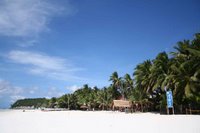 We docked in what I later learned to be Station Three, a good distance from the shore. I watched drowsily as passengers carefully balanced themselves on the gangplank with their luggage held high, and later, wading in the knee-deep water, careful not to drop anything into the waves. The process would be repeated once again, as the boat stopped in Station Two, and then later, Station One, each time, the ship emptying until it was only us on board.
We docked in what I later learned to be Station Three, a good distance from the shore. I watched drowsily as passengers carefully balanced themselves on the gangplank with their luggage held high, and later, wading in the knee-deep water, careful not to drop anything into the waves. The process would be repeated once again, as the boat stopped in Station Two, and then later, Station One, each time, the ship emptying until it was only us on board.
 It finally stopped with a gentle lurch, sand crunching beneath its bow. We had arrived. I slung my tote bag over the left shoulder, and my camera bag on my right. I then stepped off the boat, following Paolo’s, Kristine’s and Jason’s lead. I felt like an astronaut stepping onto the lunar surface for the first time. One giant leap, I thought.
It finally stopped with a gentle lurch, sand crunching beneath its bow. We had arrived. I slung my tote bag over the left shoulder, and my camera bag on my right. I then stepped off the boat, following Paolo’s, Kristine’s and Jason’s lead. I felt like an astronaut stepping onto the lunar surface for the first time. One giant leap, I thought.
The first thing I noticed was the softness of the sand beneath my slippers. There were absolutely no stones or corals, so much so that Paolo and Kristine, veterans of the Boracay experience, had already gone barefoot on the beach. Already carrying too many things, I opted to keep my slippers on, as I followed them some distance up the beach to our hotel, past Willie’s Rock, to the White House, at Station One.
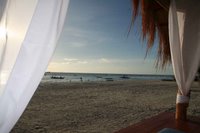 After checking in and depositing our things in our respective rooms (which were quite large and richly appointed), I received a text from Sheryl who was on the island with her high school barkada. They were still in bed, she told me, but she said she could meet me in around an hour’s time, at Jona’s. It was then ten thirty.
After checking in and depositing our things in our respective rooms (which were quite large and richly appointed), I received a text from Sheryl who was on the island with her high school barkada. They were still in bed, she told me, but she said she could meet me in around an hour’s time, at Jona’s. It was then ten thirty.
I ceremoniously removed my watch and turned off my cellular phone, depositing both into the room safe. It was now Boracay time, I thought: another way of saying that time didn’t matter, or so the Boracay veterans told me. I then changed into my boardshorts and beach shirt and, without waiting for the others, parked myself on the beach to survey our territory of the next five days. The beachfront that morning was almost deserted, save for an occasional beachcomber by the edge of the water. And the water, I saw, was glorious: shifting from transparent foam to a luminous green then blue. The sight was refreshing to the eyes.
I headed to Jona’s, taking directions from the bartender of our hotel.
Bora Babes at Jona’s
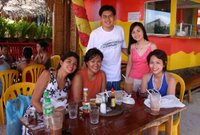 I reached the restaurant without much difficulty, and found it already full with holiday-makers in various stages of undress. I sat in one of the tables closer the entrance, and ordered my first Choco-Banana shake. Sheryl arrived some minutes later, towing a magazine she had bought to keep her company on the flight home later that afternoon.
I reached the restaurant without much difficulty, and found it already full with holiday-makers in various stages of undress. I sat in one of the tables closer the entrance, and ordered my first Choco-Banana shake. Sheryl arrived some minutes later, towing a magazine she had bought to keep her company on the flight home later that afternoon.
You hardly have a tan, I told her. She said that it was partly because she had really stayed in for most of the days she was there, and that it had been raining for the past two days. Rain? In Boracay? Didn’t seem possible, I told her.
 She then proceeded to tell me about their barkada’s activities for the past couple of days: how they enjoyed parasailing yet blew half their Bora budget in one fell swoop; how their boyfriends had stayed on over the weekend but had to leave ahead because of school or work; how they ate in this restaurant, and ordered this particular meal. After our shakes came, we drifted into catching up with each other’s lives, not having seen each other for quite some time since taking the Bar. After a few perfunctory stories, we realized that we didn’t have much to tell: life after law school has been blissfully uncomplicated and boring.
She then proceeded to tell me about their barkada’s activities for the past couple of days: how they enjoyed parasailing yet blew half their Bora budget in one fell swoop; how their boyfriends had stayed on over the weekend but had to leave ahead because of school or work; how they ate in this restaurant, and ordered this particular meal. After our shakes came, we drifted into catching up with each other’s lives, not having seen each other for quite some time since taking the Bar. After a few perfunctory stories, we realized that we didn’t have much to tell: life after law school has been blissfully uncomplicated and boring.
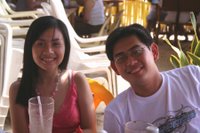 Her barkada arrived a couple of minutes later.
Her barkada arrived a couple of minutes later.
There was Karen, whom I had not seen since our college days in HPAIR, and who had recently gotten married. There was Pia, who worked in an advertising agency, and who had just won a Palanca Award for Futuristic Fiction. And there was Kara, whom I occasionally saw in the law school (and once in Amici), and who liked to take pictures like I did.
Over lunch, I told them that it was my first time in Boracay, and excitedly, they told me all the things that I could do in the five days that I would be there. I told them that a friend had quite generously made a Boracay-Must-Do for me, and I enumerated them for their approval:
1. Have a shake at Jona’s (Choco-Banana is good if you’re binging, otherwise, watermelon is the way to go);
2. At 5ish, go to Nigi-Nigi, have a drink (it’s happy hour) and enjoy the sunset;
3. Try the following: chorizo/longganisa burger sold at these stalls erywhere— they set up at around dinner time, K.O. Chicken, and the Mexican place near K.O. Chicken (although beware, food takes really long so order early);
4. Get a henna tattoo (not a must though);
5. Try the drink “Illusions” in Cocomanga’s;
6. Have lunch at the palengke— fresh seafood cooked right there (icky ambience though!);
7. For early drinks (post-supper), go to Hey Jude! (cool sounds)
8. Snorkel, paraglide, or go sailing (no banana boats— uncool)
9. Check out D’Mall but don’t buy anything (palengke na lang, it’s cheaper)
10. If you’re feeling adventurous, rent a scooter and explore the area around the beach.
Because She and Kara had a 2:15 flight back to Manila, they had to excuse themselves early from the meal, but without first insisting that I take a picture of their barkada in Boracay.
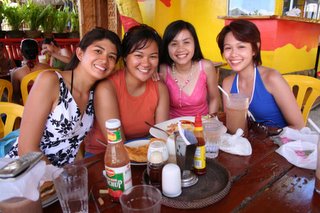
Hemingway on the Beach
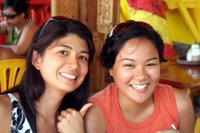 After lunch, and now without Kara and She, Karen, Pia and I started walking towards Station One, because Karen had to look for accommodations for a relative who was flying in for the weekend. It was then, while waiting for Karen as she went in and out of the various resorts, that that Pia and I got to talk about her Palanca award, about writing, and about self-expression.
After lunch, and now without Kara and She, Karen, Pia and I started walking towards Station One, because Karen had to look for accommodations for a relative who was flying in for the weekend. It was then, while waiting for Karen as she went in and out of the various resorts, that that Pia and I got to talk about her Palanca award, about writing, and about self-expression.
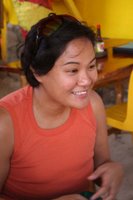 She told me how she was really surprised by the news of her winning, and how elating it was, during the awarding ceremonies, to be in the presence of those quintessential Filipino writers who have, by giving her the award, acknowledged that she knew something of their craft too. She spoke about her style of writing, how she would have stories written in her head, just waiting for birth, how she would construct concepts and flesh out stories around them.
She told me how she was really surprised by the news of her winning, and how elating it was, during the awarding ceremonies, to be in the presence of those quintessential Filipino writers who have, by giving her the award, acknowledged that she knew something of their craft too. She spoke about her style of writing, how she would have stories written in her head, just waiting for birth, how she would construct concepts and flesh out stories around them.
I spoke about my secret fantasy of winning a Palanca, but yet do not really like writing because I would feel that I am slicing myself inside out every time; and how I find writing fiction difficult, even discouraging, because my plot lines are trite, and my characters gaudy.
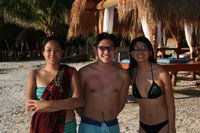 We spoke about our favorite authors, and our favorite books. About how Hemingway could say so much with so little in “A Clean, Well-Lighted Place,” and why Wong Kar Wai loved to jog. She said that I should get my writing out there. I said, sorry, I don’t have the courage.
We spoke about our favorite authors, and our favorite books. About how Hemingway could say so much with so little in “A Clean, Well-Lighted Place,” and why Wong Kar Wai loved to jog. She said that I should get my writing out there. I said, sorry, I don’t have the courage.
It was an unexpected conversation, and one which I found to be one of the more satisfying ones I’ve had in a long, long time.
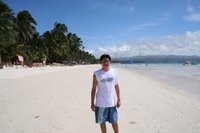 Finally reaching the end of station one with Karen, Pia and I decided to head for the water. The surf was gentle on my feet, because it broke meters away from the shore. The water was refreshing, but not cold. And the depth of the water barely reached my knees for a good ten meters from the beach, without a seashell or stone or moss or seaweed. I had to crouch down low to get my whole body wet.
Finally reaching the end of station one with Karen, Pia and I decided to head for the water. The surf was gentle on my feet, because it broke meters away from the shore. The water was refreshing, but not cold. And the depth of the water barely reached my knees for a good ten meters from the beach, without a seashell or stone or moss or seaweed. I had to crouch down low to get my whole body wet.
Hope For Me, Still
 Later, Karen joined us, saying that it was the first time, in the four days she had been in Boracay, that she had actually gone into the water. Pia drifted off onto land to get some sun, and Karen and I found ourselves reminiscing about our HPAIR days in college, and what happened to people since then, as is typical when old friends meet after many, many years.
Later, Karen joined us, saying that it was the first time, in the four days she had been in Boracay, that she had actually gone into the water. Pia drifted off onto land to get some sun, and Karen and I found ourselves reminiscing about our HPAIR days in college, and what happened to people since then, as is typical when old friends meet after many, many years.
I asked her about what married life was like, and she said it was wonderful. Ever the sucker for love-stories, I couldn’t resist asking her hers.
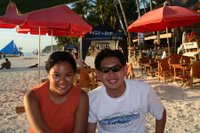 She said that they had met through a blind date set-up by a mutual friend. They had immediately hit it off so that they became a couple only a short time later, before he was to return to his work in Singapore. Of course, the marriage proposal was romantic, as perhaps I imagined all proposals would be: in the restaurant where they had their first date. Then everything just seemed to fall into place.
She said that they had met through a blind date set-up by a mutual friend. They had immediately hit it off so that they became a couple only a short time later, before he was to return to his work in Singapore. Of course, the marriage proposal was romantic, as perhaps I imagined all proposals would be: in the restaurant where they had their first date. Then everything just seemed to fall into place.
 "“When you meet the right one,” she said, “everything simply does. Doesn’t really matter how long you’ve known him.” And I knew she was content.
"“When you meet the right one,” she said, “everything simply does. Doesn’t really matter how long you’ve known him.” And I knew she was content.
So, it happens pala,” I said. “I thought blind dates and ocean romances happen only in the movies.”
“Oh, yes, it happens. Oh yes,” she enthusiastically replies.
“May pag-asa pa pala ako,” I say, laughing.
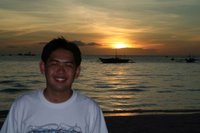 The sun was already setting when Karen, Pia and I decided to get drinks from Jona’s. After a whole afternoon of being on the beach, I was looking forward to a cold, cold mango shake. We sat in the benches outside, and watched a group of foreigners play the locals in an intense game of volleyball. The beach was more crowded here, with people playing Frisbee, volleyball, and even football right beside the water.
The sun was already setting when Karen, Pia and I decided to get drinks from Jona’s. After a whole afternoon of being on the beach, I was looking forward to a cold, cold mango shake. We sat in the benches outside, and watched a group of foreigners play the locals in an intense game of volleyball. The beach was more crowded here, with people playing Frisbee, volleyball, and even football right beside the water.
And I witnessed my first Boracay sunset.

At a little after six, Pia, Karen and I parted ways, exchanging numbers and email (for the pictures, of course). They were going to have dinner in this superb Indian place, True Food, which they couldn’t when the others, who were on a tight budget, were still around. I was going to head back to check out my group whom I had inadvertently abandoned for the afternoon.
Walking back to the hotel, I had to remind myself that I was already actually in Boracay. A breeze was blowing from the ocean, and in the darkening silhouettes against the beach, I thought about how quickly the afternoon had sped by. While it was still difficult to shake off the stresses and issues of Manila (and because I was still rather drowsy from having only two hours of sleep), the comfortable sound of the waves prodded me to put a little bit more effort into entering the Boracay state of mind. Resistance would be futile.
Viva la Mañana
After taking a shower, I met Paolo, Kristine and Jason on the beach, and made another trek back to Station Two. The crowd was still thin, I observed; perhaps more people would fill the restaurants once the long weekend began. Already, while walking, I could see those exquisite Boracay sandcastles, now lighted by improvised kerosene lamps, reigning over the now emptying beach.
We settled on a Mexican restaurant, Mañana. The prices were rather steep, but then, Kristine explained that they were typical tourist prices in a place like Boracay. I ordered a very cold beer, and heartily ate my chicken burrito combo.

After dinner, because Jason was still jetlagged, and I having had only two hours of sleep, the group decided to just make a quick survey of Station Two, down towards the Boracay Regency. Kristine would once and a while point out interesting restaurants to eat at, or places which we might want to visit: Hey Jude, D’Mall, Aria, Wave, among others.
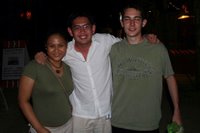 We got back to the hotel at around eleven o’clock, passing the noisy Pier One and Cocomanga’s on our walk back. Tomorrow, I told myself. Today, I’m just too tired. Jona’s, apparently open for twenty-four hours, still had some patrons lounging on the chairs out on the beach, sipping shakes.
We got back to the hotel at around eleven o’clock, passing the noisy Pier One and Cocomanga’s on our walk back. Tomorrow, I told myself. Today, I’m just too tired. Jona’s, apparently open for twenty-four hours, still had some patrons lounging on the chairs out on the beach, sipping shakes.
I entered my room, and felt dead tired. The day seemed to pass like a blur, lightheaded as I was from lack of sleep. Was I really in Boracay? Seemed like it. After performing my evening rituals, I plopped onto my bed, and in no time, I was fast asleep.
DAY TWO [November 25]: Getting into the Groove
Chicken in a whole new light
 My second day in Boracay was filled with rather ordinary activities one would expect to do on any beach: sunbathing, snorkeling, getting drunk. But being in Boracay, they took on an added novelty.
My second day in Boracay was filled with rather ordinary activities one would expect to do on any beach: sunbathing, snorkeling, getting drunk. But being in Boracay, they took on an added novelty.
The day began early for me. I got up at around nine thirty, and had my complimentary breakfast on the beach. Already in my beach clothes after leaving the room, I opted to begin my campaign to give my skin a little color, and so laid down on the white beach chairs in front of our hotel, put on the IPod, and let the sun do its business. Paolo, Kristine and Jason by this time had already been roused back to life and were lounging on the beach with me. Kristine was buying some bracelets from the local children, while Paolo was making arrangements with some locals from the talipapa for our seafood dinner later that evening.
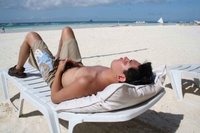 After about an hour, I decided to cool off in the water before going out for lunch. Sitting in the shallows alone, I let the waves gently lap against my body, thinking how small I saw amidst the vastness of the ocean. Yet still, I felt strangely safe and comfortable, like the embrace of an old friend. It was too long since I’ve been back on a beach, I thought, and it was good to just drift. To just drift.
After about an hour, I decided to cool off in the water before going out for lunch. Sitting in the shallows alone, I let the waves gently lap against my body, thinking how small I saw amidst the vastness of the ocean. Yet still, I felt strangely safe and comfortable, like the embrace of an old friend. It was too long since I’ve been back on a beach, I thought, and it was good to just drift. To just drift.
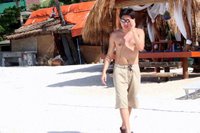 Lunch came soon enough, and wanting to save a few pesos following last night’s rather expensive dinner, we opted for a budget meal at Andok’s lechon manok, at D’Mall. I tell you, you will never look at Andok’s the same way again after having it in Boracay, following a restful morning on the beach, washed down with a cold, cold glass of Coke.
Lunch came soon enough, and wanting to save a few pesos following last night’s rather expensive dinner, we opted for a budget meal at Andok’s lechon manok, at D’Mall. I tell you, you will never look at Andok’s the same way again after having it in Boracay, following a restful morning on the beach, washed down with a cold, cold glass of Coke.
An Afternoon in the Water
 After briskly walking back to the hotel, we gathered our towels and headed off into a rented boat for an afternoon of snorkeling. While reminding me much of our Puerto Galera vacation some years back, the boat ride was more choppy because the waves around the island were much larger and more persistent. Putting on our life vests, and choosing our rented snorkels, the boatmen brought us to a spot just off the Boracay pier, past the rocky crags I had seen going in on the ferry from Caticlan, in the Tabon Strait, within sight of Crocodile Island. The waves there were rough and frequent, but the boatmen said that it was safe.
After briskly walking back to the hotel, we gathered our towels and headed off into a rented boat for an afternoon of snorkeling. While reminding me much of our Puerto Galera vacation some years back, the boat ride was more choppy because the waves around the island were much larger and more persistent. Putting on our life vests, and choosing our rented snorkels, the boatmen brought us to a spot just off the Boracay pier, past the rocky crags I had seen going in on the ferry from Caticlan, in the Tabon Strait, within sight of Crocodile Island. The waves there were rough and frequent, but the boatmen said that it was safe.
I was reluctant to get into the water, at first, because I figured that at would be chilly. The sun had been covered by heavy clouds all afternoon, and a cold wind blew from the Sibuyan Sea. Eventually, however, I jumped in.
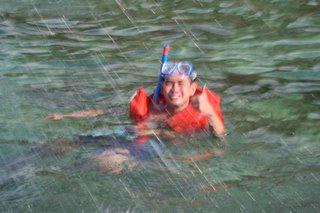
After about thirty minutes, as the waves were getting fiercer, we left for a snorkeling site much closer to the beach, with friendlier waters. We were brought to a spot just off the southern part of White Beach, to an area specially cordoned off for snorkelers. Already, there were two other boats anchored in the area sharing the site with us. From where we swam, we had a good view of the entire beach, and the waters were just right for swimming.
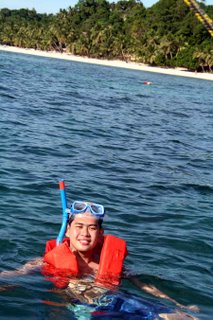
We spent a good hour there, admiring the nearly gray corals under some thirty feet of water. There were some clown fish, angel fishes; Kristine even claimed to have seen a large tuna. I was just happy bobbing up and down on the sea, watching as the clouds went by.
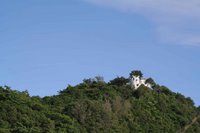 Not satisfied with the experience, we asked that we be taken to another spot on the northern end of the island, and so, gladly obliging, the boatmen sped the length of White Beach, past Club Panoly and Nami Beach Resorts, to a place just off Punta Bunga. We dropped anchor beside a huge rock, and looked on as half-naked women frolicked unsuspectingly on the private coves tucked away behind dense foliage.
Not satisfied with the experience, we asked that we be taken to another spot on the northern end of the island, and so, gladly obliging, the boatmen sped the length of White Beach, past Club Panoly and Nami Beach Resorts, to a place just off Punta Bunga. We dropped anchor beside a huge rock, and looked on as half-naked women frolicked unsuspectingly on the private coves tucked away behind dense foliage.
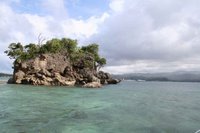 We spent some minutes there, living in the moment, as the sun slowly met the horizon.
We spent some minutes there, living in the moment, as the sun slowly met the horizon.
The boatmen then suggested that we hit land before the sun fully set, and that it would be best to enjoy the dusk on one of the smaller beaches not far from where we were anchored. The beach they had in mind was called Diniwid, just behind the curve of rock which separated it from White Beach. I was happy with the suggestion, having gotten a bit seasick from all the rocking of the waves— being on land, I thought, was a good thing. It was, as it turned out, a pretty good place to watch the sunset.
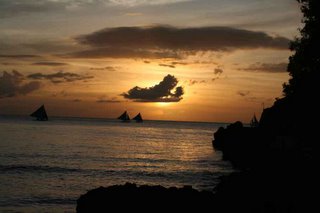
Upon arriving, Kristine had quickly plopped down on the sand and took a nap. Paolo went off taking pictures, and Jason stood by the water, throwing stones. I sat on the beach, put on the IPod and disengaged.
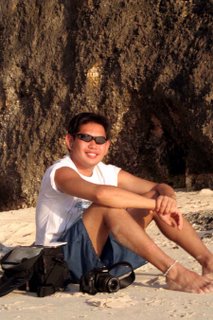
The sun was already slipping under the horizon when we arrived back on the beach fronting our hotel. I waded back onto the shore, feeling slightly hungry, looking forward to our seafood feast that evening. I parked myself on one of the beach chairs, feeling tired for the first time from the activities of the afternoon. I rested my feet on the chair and was immediately lulled into the timelessness of the moment, as sea and sky played tricks on the eye. I saw children playing in the sand by the water, their shadows dark against the darkening sky.

Nocturnal amusements
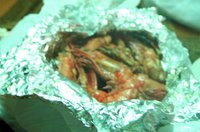 I think I dozed off for a couple of minutes, because when I woke up, Paolo and Kristine were already preparing our little bungalow for our seafood dinner. I ran to my room to take a quick shower, and to prepare for the evening’s activities. I went back to the beach and found our table set with two plates full of tiger prawns and a king crab broken into little pieces. Indeed, the expectation was well worth it, as the food did not disappoint.
I think I dozed off for a couple of minutes, because when I woke up, Paolo and Kristine were already preparing our little bungalow for our seafood dinner. I ran to my room to take a quick shower, and to prepare for the evening’s activities. I went back to the beach and found our table set with two plates full of tiger prawns and a king crab broken into little pieces. Indeed, the expectation was well worth it, as the food did not disappoint.
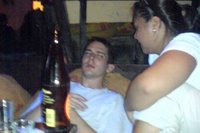 At around nine o’clock, at a time when we could barely move from our seats, Kristine proposed that we get on with the evening’s festivities. Because it was still rather early, she proposed that we go to Wave first, which was right beside the Boracay Regency, and have a couple of beers there, before hitting the drinks hard at Cocomanga’s.
At around nine o’clock, at a time when we could barely move from our seats, Kristine proposed that we get on with the evening’s festivities. Because it was still rather early, she proposed that we go to Wave first, which was right beside the Boracay Regency, and have a couple of beers there, before hitting the drinks hard at Cocomanga’s.
Needless to say— and because what happens in Boracay stays in Boracay— some of us got plastered. But some more than others.
DAY THREE [November 26]: Sunny Day, Rainy Afternoon
Colleagues on the Beach
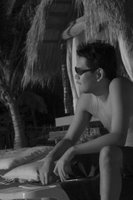 As would be expected, the morning began pretty late for me, but strangely, without a hang-over. Cheeky had sent me a text message the night before, telling me that they would be on the island on the 9 a.m. flight from Manila. I sent her a message asking what their plans were for the morning. She replies, she and Ice’s family are just having breakfast. We planned to meet sometime during lunch.
As would be expected, the morning began pretty late for me, but strangely, without a hang-over. Cheeky had sent me a text message the night before, telling me that they would be on the island on the 9 a.m. flight from Manila. I sent her a message asking what their plans were for the morning. She replies, she and Ice’s family are just having breakfast. We planned to meet sometime during lunch.
After having my complimentary breakfast by the beach, I resumed my project to give-Peej-some-color. It did not take long before I felt parched and dehydrated, opting again to finish my session with a dip in the ocean. Sensing that it was about noontime, the heat beating hard against my back, I got out of the water, took a shower, and prepared to meet Cheeky and Ice at their hotel, the Boracay Regency. Not seeing any of my travel buddies, I figured that they were still asleep. (We had planned to go around the island by tricycle by eleven that morning, but sensing the condition of our going home the night before, I wasn’t surprised that the schedule was pushed back a couple of hours.)
 I met Cheeky and Ice outside the swanky Boracay Regency. I was really glad to see my favorite seatmate and good friend, whom I would be working with come the beginning of January. Wearing her bikini top beneath her beach shirt, I encouraged her to take it off and get into the proper Bora attire. She, insanely insecure about her body, said that she would have to work the courage sometime during the day. It was an unfounded insecurity.
I met Cheeky and Ice outside the swanky Boracay Regency. I was really glad to see my favorite seatmate and good friend, whom I would be working with come the beginning of January. Wearing her bikini top beneath her beach shirt, I encouraged her to take it off and get into the proper Bora attire. She, insanely insecure about her body, said that she would have to work the courage sometime during the day. It was an unfounded insecurity.
 As expected, we found ourselves walking towards Jona’s for a shake. Getting there, we each ordered a shake and got right into calling Tinggay, a classmate of ours who was at the firm working, hoping to make her envious. I said, “Grabe, Tinggay, ang sarap ng ice tea shake, right on the beach, with the wind in my hair and the sun on my face. Eh, ikaw, ano nga uli ang ginagawa mo?”
As expected, we found ourselves walking towards Jona’s for a shake. Getting there, we each ordered a shake and got right into calling Tinggay, a classmate of ours who was at the firm working, hoping to make her envious. I said, “Grabe, Tinggay, ang sarap ng ice tea shake, right on the beach, with the wind in my hair and the sun on my face. Eh, ikaw, ano nga uli ang ginagawa mo?”
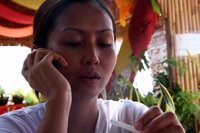 “Gumagawa ng opinion, bakit? Well, pupunta naman kami diyan sa December 1,” she said defensively. The firm was treating everyone to an all-expense paid Boracay trip, with an option to bring one companion, free. “At, hoy, at least, when I go there, kasama ko boyfriend ko. Ikaw, sino kasama mo?” She laughed heartily. I feigned wounded feelings.
“Gumagawa ng opinion, bakit? Well, pupunta naman kami diyan sa December 1,” she said defensively. The firm was treating everyone to an all-expense paid Boracay trip, with an option to bring one companion, free. “At, hoy, at least, when I go there, kasama ko boyfriend ko. Ikaw, sino kasama mo?” She laughed heartily. I feigned wounded feelings.
 “Colleague, wala akong nasabi do’n, a,” I said. “Grabe, fine, fine. Pick on me! O, eto si Cheeky. Sana mag-usap kayo nang matino.”
“Colleague, wala akong nasabi do’n, a,” I said. “Grabe, fine, fine. Pick on me! O, eto si Cheeky. Sana mag-usap kayo nang matino.”
Paolo then sent me a message, saying that they had scheduled our day trip around the island at one o’clock, and whether I wanted to go. For a moment, I was tempted on staying, but I thought, Ice and Cheeky might appreciate being alone together for the afternoon. I replied yes, and told them to wait for me.
 Some twenty minutes passing, after a lot of laughs and blank stabs at Ice’s present predicament with Cheeky, I left telling them to expect a text message from me for the evening’s activities. It was a good lunch, I thought, even if we only did have fruit shakes. Feeling so good, in fact, was I that I remember that it was on that walk back to the hotel from Jona’s, with the sun not too hot against my skin, and the sky the bluest I had ever seen, that I knew that I really was in Boracay, at last.
Some twenty minutes passing, after a lot of laughs and blank stabs at Ice’s present predicament with Cheeky, I left telling them to expect a text message from me for the evening’s activities. It was a good lunch, I thought, even if we only did have fruit shakes. Feeling so good, in fact, was I that I remember that it was on that walk back to the hotel from Jona’s, with the sun not too hot against my skin, and the sky the bluest I had ever seen, that I knew that I really was in Boracay, at last.
Never Saw Blue Like That
 I put on the IPod carefully snuggled in my camera bag, and for some strange reason, found myself listening to John Mayer’s Love Song for No One. His introduction to the acoustic version touched off the musical high:
I put on the IPod carefully snuggled in my camera bag, and for some strange reason, found myself listening to John Mayer’s Love Song for No One. His introduction to the acoustic version touched off the musical high:
This is a song about, uh, talking to the person that you haven’t even met yet. And, uh, maybe they’re rolling around the hay with someone else but. . . but not as good as you’ll be.
It’s just got a way to turn. She’s out there. He’s out there. They’re just learning what to contrast you against.
Indeed, perhaps it was because of the youthful defiance of his lyrics, or the upbeat rhythm of his guitar that I found myself singing out loud, with a big smile on my face, and giddy, for the first time in a very long time, that life had finally begun. A strange optimism tided over me like a blanket, that I felt that anything was possible, that happiness was actually just over the horizon.
I’m tired of being alone,
So hurry up and get here.
I sang, like an idiot on the beach. I was then reminded of the lyrics of one of Hale’s better songs which I thought quite captured the moment:
The sun is sure to shine
For you and me for everyone
So don't be sad it's just the start
Of a new beginning in your life
Coz there's a blue sky waiting tomorrow
Waiting tomorrow
shining and shimmering
A blue sky waiting tomorrow
Waiting tomorrow
Maybe it's all we need
With a hop and skip, I met Paolo, Kristine and Jason waiting by the beach-side entrance of our hotel. We promptly crossed over to the rear of the hotel where a tricycle was waiting on the road. They weren’t like the tricycles in Manila which had a sidecar which could fit only two more people; the Boracay tricycles, I observed, had seats both facing forward, beside the driver, and behind, with two rows facing each other. We picked our seats, and we were off.
Mount Luho
Our first stop, after a bumpy ride which at some point we had to take on foot, was Mt. Luho, the highest point on the island. Climbing the observation deck, I could see not only White Beach, but also the Bluewater Golf Club and the Bulabog Beach, which was opposite White Beach, landward. It was on the deck, I think, that the tourist in me came out most (if it hadn’t already, while on the beach). With my camera in hand, I couldn’t stop taking pictures, first of the views, and then, with myself and my friends in them. Needless to say, the scenery was magnificent.

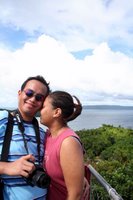
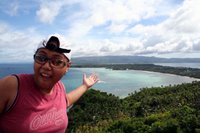
Unexpected Cockfight
We got into the tricycle again, backing up where we had passed, and through the same bumpy road, uncemented at times, we were brought to a muddy clearing where a cockfight was being held. Under trees of Narra, locals huddled two deep around a pen, probably eight meters square, while bookies stood in the middle taking bets for the round. Owners of fighting cocks circled anxiously around the pen, gently caressing their prized-fighters, attaching talons to their feet. It was a pretty interesting experience, a proper subject for an extended aricle, I thought, or perhaps even a photo essay.
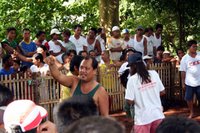
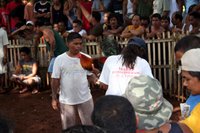
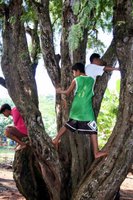
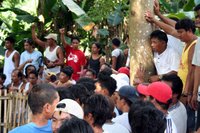

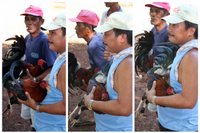 Puka Beach
Puka Beach
We spent a full hour at the cockpit, giving our American friend, Jason, more time to take in what certainly was something that he would probably never encounter anywhere else. Muddied sandals dirtied the tricycle floor, as we sped off to Puka Beach, ten minutes away. The beach, of course, was made famous by the shells bearing the same name, so popular in the seventies as part of the proper hippie fashions.
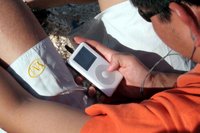
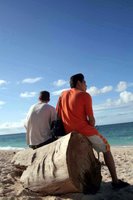
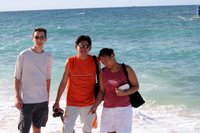
The 800-meter beach was virtually deserted when we arrived, and I thought it to be a perfect place for a sunset picnic when I came back. The wind blew strong from the north, inland, and over in the distance, we could see the islands Romblon. Naturally, we took plenty of pictures.

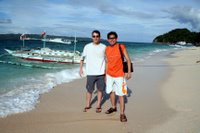
We stayed some time on the beach, savoring the cool sea breeze and the strong surf. The absence of people was a charming change from the bustle that was beginning to be White Beach, as the weekend fast approached.
Manoc-Manoc
Because we were getting rather hungry, not having had lunch earlier, we asked the driver to take us where we could buy some quick food to tide us over until dinner. We were brought to a town called Manoc-Manoc, which had, at the end of the main road, its own beach which the locals say is best for windsurfing. We lingered in the town, watching the people, some playing billiards, others playing basketball, others lounging around amused, perhaps, at Jason’s strange skin and blue eyes. The children were particularly friendly, posing for our cameras with the gusto of screen child-stars.
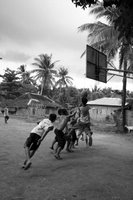


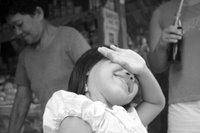
Umuulan ba na naman?
We headed back to White Beach at nearly five thirty in the afternoon, and it was then that it began to rain. Already, while in Manoc-Manoc, the sky showed shades of heavy gray, and the wind began to get chilly. It was a strange experience, actually, sitting in that tricycle, drowsy from the drone of the engine, one hand gripping the bar above my head to stop me from falling, playing Everything but the Girl on the IPod, and watching the rain drip from the edge of the tricycle roof. A sort of melancholy descended over me. It was not over anything in particular, no one memory, person or event; just an overwhelming feeling of nostalgia I couldn’t quite shake off.
Sitting in the tricycle, barely sheltered from the rain, I was reminded of one of Jimmy Bondoc’s songs from the play Boracay, which he wrote while still in Dulaang Sibol, a couple of months before graduating from high school. He explains the song’s meaning this way: imagine being in Boracay, all excited and looking forward to the day, and all of a sudden, it rains. It was both a rain that was both physical and metaphorical, of course, and sitting there in the tricycle, I somewhat understood what he meant. Some of the lyrics go:
Umuula ba na naman?
Lumuluhang langit ay pagmasdan.
Ang gabi’y wala buwan.
Gabi na, lumipas na ang araw.
Gabi na, ang kahapon ay pumanaw.
Ang kanina ay kahapon, lumaon.
Ang kanina mo’y inalagaan o tinapon
Ang kanina’y wala na.
Gabi na.
Umuula ba na naman?
Lumuluhang langit ay pagmasdan.
Ang gabi’y wala buwan.
Gabi na, lumipas na ang araw.
Gabi na, ang kahapon ay pumanaw.
Paano man pagkaingatan o iwasan
Laging may aalis at may maiiwan
It was in that perfectly melancholic moment that I found myself out on the sand again in front of our hotel following the tricycle ride, watching as another day drew to a close. It was then that I remembered a special request a friend had asked: “Please promise me you’ll listen to the song Kissing on one sunset. . . . you’ll understand why.” So I fished the IPod from my camera bag, and dutifully searched for the song, pressed play, and listened.
The red light of the sun,
Slowly descending
The sky is all I see,
It’s never ending
We could fly, you and I
On the clouds, kissing, kissing
The wind plays with the leaves
The weather turns colder
But as long as we believe
Love doesn’t get older
We could fly, you and I
On the clouds, kissing, kissing
On a journey of the heart
There’s so much to see
And when the sky is dark
You’ll be right here
Right here with me
Right here with me
Kissing, Kissing
I had to agree, it was a perfect sunset song.
Just then, I spotted a couple crossing the beach, by the edge of the water. I had to snap a picture; it turned out to be one of my favorite shots of the trip:
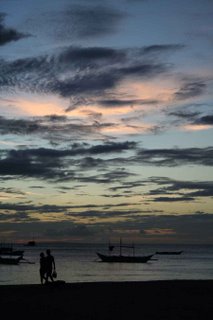
Too much of a good thing
That evening, we opted for another cheap dinner at Andok’s in D’Mall. I don’t know whether it was the tiredness of the day’s activities, the lethargy of the Boracay mentality, or the rain that poured in the afternoon, but we ate somberly, once and while commenting on the people that walked up and down the path beside our table. We planned to spend a quiet evening, in contrast to the loud, rocking noise that defined the previous night. I sent a message to Cheeky that we would be at Hey Jude in a couple of minutes, and I invited them to follow.
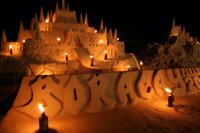 After dinner, we took a walk from D’Mall to the beach, and took pictures of more of those castles that mysteriously grew from the sand come sundown. I learned later on that the same meticulously built sandcastles would be demolished by evening’s end, only to be rebuilt again the next day: it was a way to ensure that donations from tourists be collected only when the castles were still standing.
After dinner, we took a walk from D’Mall to the beach, and took pictures of more of those castles that mysteriously grew from the sand come sundown. I learned later on that the same meticulously built sandcastles would be demolished by evening’s end, only to be rebuilt again the next day: it was a way to ensure that donations from tourists be collected only when the castles were still standing.
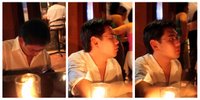 We settled into Hey Jude moments later, ordering Vodka Sprites and Bailey’s Mixers. The easy house music drifted through the bar, and added to the indolence we were feeling. It was one of the more classy bars on White Beach, I found, patronized by the more fashionably conscious of beach-goers. At some point, Cindy Curleto even swung by and sat by the bar, much to our star-struck delight. Nothing like cheap thrills.
We settled into Hey Jude moments later, ordering Vodka Sprites and Bailey’s Mixers. The easy house music drifted through the bar, and added to the indolence we were feeling. It was one of the more classy bars on White Beach, I found, patronized by the more fashionably conscious of beach-goers. At some point, Cindy Curleto even swung by and sat by the bar, much to our star-struck delight. Nothing like cheap thrills.
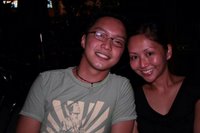 Cheeky, Ice and his sister arrived a little after eleven, and we were momentarily joined by Edcel Tupaz, who was there with his father, attending the annual convention of Law Deans in the Philippines. Even the Dean of our law school was on the island, he said. Everyone, it seemed, was taking advantage of the long weekend.
Cheeky, Ice and his sister arrived a little after eleven, and we were momentarily joined by Edcel Tupaz, who was there with his father, attending the annual convention of Law Deans in the Philippines. Even the Dean of our law school was on the island, he said. Everyone, it seemed, was taking advantage of the long weekend.
We stayed on until an hour past midnight.
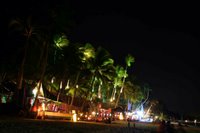 Heading back to the hotel, we all took our separate ways, I, finding myself walking alone by the edge of the water. It was a soothing evening, I found, and I enjoyed the gentle sound of the lapping of the waves and the soft comforting sand under my feet. The semi-darkness only added to the reminiscences that did not quite fully descend, and while I could hear the muffled rhythmic beating of the music from the bars on the opposite side of the beach fronting the water, the wistfulness of the moment was much more potent to be drowned away.
Heading back to the hotel, we all took our separate ways, I, finding myself walking alone by the edge of the water. It was a soothing evening, I found, and I enjoyed the gentle sound of the lapping of the waves and the soft comforting sand under my feet. The semi-darkness only added to the reminiscences that did not quite fully descend, and while I could hear the muffled rhythmic beating of the music from the bars on the opposite side of the beach fronting the water, the wistfulness of the moment was much more potent to be drowned away.
Looking out onto the ocean, black now under a starless sky, I did not know whether it was the rain, the sunsets, or the alcohol, but I found myself missing people. And that was the sweetest of all nostalgias.
DAY FOUR [November 27]: Me-Time
We set aside Sunday as a day of rest. We did not plan any activities; sleeping-in seemed to be a real option. I had announced the night before that I would be taking some time off with myself, and that I would just meet up with them come dinner time.
I was woken early by an ubiquitous text message at six-forty in the morning, and could no longer get back to sleep; and so, deciding that it was too good a day to spend in bed, I got up and, after breakfast, took in more of the sun and the water. Our side of the beach was, as it had always been, almost deserted, and I felt that I had the entire beach to myself. After about an hour and a half of bathing both in sun and sea, I went back to my room, took a long shower, and turned on the TV while getting dressed for the day. The Simpsons was on, and then Whose Line Is It Anyway, followed by Desperate Housewives, and Malcolm in the Middle. Never have I taken so long putting on a shirt.
Picture Orgy
 Feeling hunger— I figured that it was about two in the afternoon already— I headed towards Station Two, thinking of having some good pasta at Aria, which I had noted on the numerous times I had passed it. Reaching the restaurant, however, I found the prices to be too steep for my tastes: a pomodoro costed around three hundred pesos. Not wanting to withdraw money from the nearby ATM, I settled on lunch at BiteClub at D’Mall. I sat in the open air, put on the IPod, and watched as people milled about around me. I felt good feeling anonymous.
Feeling hunger— I figured that it was about two in the afternoon already— I headed towards Station Two, thinking of having some good pasta at Aria, which I had noted on the numerous times I had passed it. Reaching the restaurant, however, I found the prices to be too steep for my tastes: a pomodoro costed around three hundred pesos. Not wanting to withdraw money from the nearby ATM, I settled on lunch at BiteClub at D’Mall. I sat in the open air, put on the IPod, and watched as people milled about around me. I felt good feeling anonymous.
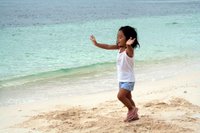 Figuring that it was probably the only chance I had to walk the entire strip of White Beach before I went back to Manila, I ventured south, past the restaurants and resorts of Station Two, past rows of Europeans tanning on the sand, past the talipapa and the rows of dive shops and budget resorts of Station Three, finding myself at last at the end of White Beach, terminating in rock formations jutting out from the shallow sea.
Figuring that it was probably the only chance I had to walk the entire strip of White Beach before I went back to Manila, I ventured south, past the restaurants and resorts of Station Two, past rows of Europeans tanning on the sand, past the talipapa and the rows of dive shops and budget resorts of Station Three, finding myself at last at the end of White Beach, terminating in rock formations jutting out from the shallow sea.
 Naturally, the entire walk was a photo-trip, or, as Jason would put it: a photo-orgy. So engrossed was I in taking photographs, that I did not notice that it was nearly four in the afternoon— time of the second, and last Mass for the day. And so, I left the beach quickly, trying to find a path which connected to the inland road, hoping to find a ride. Following a couple of cues from the locals, I found my objective, right behind the Station Three docking port, and quickly jumped into the next tricycle then waiting.
Naturally, the entire walk was a photo-trip, or, as Jason would put it: a photo-orgy. So engrossed was I in taking photographs, that I did not notice that it was nearly four in the afternoon— time of the second, and last Mass for the day. And so, I left the beach quickly, trying to find a path which connected to the inland road, hoping to find a ride. Following a couple of cues from the locals, I found my objective, right behind the Station Three docking port, and quickly jumped into the next tricycle then waiting.
Advent in Boracay
The church was on the main highway, a simple steel structure with unenameled walls and a corrugated steel roof. The Mass was in English, and the priest spoke about advent, and being prepared. I stood by the door, leaning against the filigreed gate off to the left of the altar, because the church was filled, both of locals, and holidaymakers fulfilling their Sunday obligations. The Mass ended some twenty minutes past five, and having said my final prayers, I followed the crowd and spilled out into the courtyard of the church. I met Edcel with his parents, who graciously offered me a ride back to Station One. I declined, saying that the walk was probably good for me. I soon enough found out that the walk was almost even unnecessary, because getting back onto the beach, the church was only a leisurely five minute walk to our hotel.
The sky, I observed, was gray again, and I knew that it would soon again rain. This notwithstanding, I decided to go ahead and get that massage on the beach I had planning since I arrived on the island. Because Jason had been indulging himself with massages over the past three days, he suggested that I get mine at the SeaWind resort next door. I followed his advice, and after asking for a masseuse, quickly plopped down on one of the beach chairs neatly laid down in rows on the sand.
I watched my last Boracay sunset on my stomach— which wasn’t such a bad thing.

While finishing up with my massage, gooey from all the coconut oil on my skin, I received a text message from Edcel, telling me that they were at Nigi, enjoying happy hour. I told them I would try to follow. I rushed back to the hotel room, and stayed quite a while in the shower washing off all the coconut oil. I realized that my body started to ache from the impact of the afternoon’s massage.
Last Supper
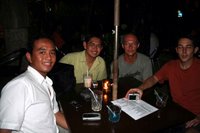 The evening went by in a blur, with our last dinner back at Mañana, but this time, with a new friend, Yukka, whom Paolo and Kristine had met while having an afternoon drink at Hey Jude. He was from Finland, a computer engineer, taking a year-long vacation to travel around the world. He had been to Nepal before going to the Philippines, and had been on the island for the last two weeks. He was to depart the next day for Palawan, and then Sagada, rounding off his trip with a couple of days in Manila, before finally flying to Cambodia. I listened to Yukka, who spoke perfect although accented English, and thought it somewhat surreal that people actually took one year vacations to travel the world, without much more than a sense of adventure, and a pack of clothes on their backs.
The evening went by in a blur, with our last dinner back at Mañana, but this time, with a new friend, Yukka, whom Paolo and Kristine had met while having an afternoon drink at Hey Jude. He was from Finland, a computer engineer, taking a year-long vacation to travel around the world. He had been to Nepal before going to the Philippines, and had been on the island for the last two weeks. He was to depart the next day for Palawan, and then Sagada, rounding off his trip with a couple of days in Manila, before finally flying to Cambodia. I listened to Yukka, who spoke perfect although accented English, and thought it somewhat surreal that people actually took one year vacations to travel the world, without much more than a sense of adventure, and a pack of clothes on their backs.
It started to rain.
After dinner, we drifted towards Hey Jude once again, outside on the sand, barely sheltered from the rain. The crowd was much thinner, and the other stores were closing much earlier than on the previous nights. Boracay slept on Sunday, I thought. I ordered a couple of Bailey’s shakes, and the others chose beers and Vodka Sprites. Rain had prevented Cheeky and Ice from following, and our spirits were somewhat dampened too by the fact that we spent our last night on the island under a mild downpour. Nonetheless, the drinks and the conversation flowed freely. Kristine had, quite unwittingly, found herself hostage by the bar, offered drinks of every sort and color by the bar tenders free of charge. It was not difficult to see, at that point, that at least one of us was going home drunk that night.
DAY FIVE [November 28]: Parting Shots
Encroachments
I woke up knowing that it was my last day in Boracay. Perhaps it was the feeling that everyone got when something good was about to end, with reality and time slowly creeping into this self-chosen retreat. The giddy expectation I found at the start of every morning was replaced by a sense of urgency, that I had still stuff to do before leaving: confirming my flight out, packing my clothes, buying pasalubong. I got my watch from the room safe, found that it had stopped, shook it back to life, and adjusted the time. I put my cellphone in the left pocket of my camera bag, and the IPod in the other.
Wanting to get as many things done before lunch, I got out of bed and began packing my bag. After my last breakfast, I confirmed my Air Philippines flight, inquiring about transfers from the island to the airport. I had to be leaving by 2:15 that afternoon, to catch my 3:30 flight home. A ferry, they said, regularly crossed the channel, but it was good to leave early.
I took a tricycle to the talipapa, getting down at the same place I had found a tricycle to the church the day before. I browsed the stalls for sarongs and necklaces to bring back to Manila, haggling for a better price. I eventually found what I had been looking for, and, wanting to get the transaction over with, bought everything in bulk.
Satisfied that I was able to buy my pasalubongs on my own, at a reasonable price, I headed back to the hotel. It was then that I realized that my cell phone was no longer in the pocket of my camera bag. I stopped, searched for it in the pockets of my boardshorts, and even inside my camera bag. It was not there. I paused and made certain that I did not leave it in the hotel room. No, I did not, I told myself. It was then that it dawned on me that my phone had been stolen!
My heart jumped a moment, when I remembered that I had placed the IPod on the other pocket, and quickly felt for its presence. Thankfully, it was there. Good thing, I thought, or I wouldn’t be able to forgive myself (or she, me, for that matter). I fished it out from the pocket, and placed it snuggly into my camera bag, keeping it close. I rushed back to the hotel, intending to have the phone line suspended, and while I was on the tricycle, I was momentarily annoyed by what had happened. I had left my camera bag on the beach so many times; it had lulled me into the false idea that in paradise, everything was perfect. Apparently, it was not. It was a rude awakening from the Boracay state of mind.
Reaching the hotel, I went to Paolo’s room, told him what had happened, borrowed his cell phone, and called home to ask to have my line suspended. For five minutes, I was pissed. It was the first time that anything had been stolen from me, and I felt powerless to retrieve what I had lost. But then, I told myself, I did not want that to ruin my great vacation. And then I was no longer pissed.
Temptations
I lounged in Paolo and Kristine’s room for a couple more minutes, feeling lethargic from the heat of the morning’s shopping. Kristine was still wrapped under blankets, nursing a hangover, without any indication of wanting to get up from bed, much less move. Paolo, ever the fussy boyfriend, was busy packing their bags. It was such a domestic scene, I thought, and I wondered, were things only this simple. It looked like they knew what they were doing.
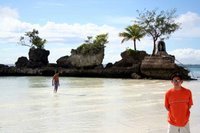 I went back to my room moments later, and finished packing my things. It was nearly one o’clock, and I wanted to grab some lunch before leaving. Since Jason was having another massage, and Kristine still sedated, I asked Paolo to go with me for a quick lunch. We walked over to the Andok’s behind Jona’s, across the road, and joked about extending our trip.
I went back to my room moments later, and finished packing my things. It was nearly one o’clock, and I wanted to grab some lunch before leaving. Since Jason was having another massage, and Kristine still sedated, I asked Paolo to go with me for a quick lunch. We walked over to the Andok’s behind Jona’s, across the road, and joked about extending our trip.
I honestly could, I told Paolo, because I had nothing to do. In fact, that really was the contingency, had I flown with Philippine Airlines which had a booking for a return flight only on the next day. Alone in Boracay, I thought, there was a quotidian romance to it, something not alien to me but novel at the same time. But my mind was already programmed to leave mid-afternoon.
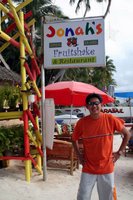 We crossed the street and went to Jona’s for one last shake, with Kristine requesting for a take away. While walking back to the hotel, Edcel called out to me from the terrace of Waling-Waling, a beer in hand, saying, Peej, have a beer.
We crossed the street and went to Jona’s for one last shake, with Kristine requesting for a take away. While walking back to the hotel, Edcel called out to me from the terrace of Waling-Waling, a beer in hand, saying, Peej, have a beer.
I told him that I had a flight in a couple of hours. They were leaving the next day.
Why don’t you just extend, he suggested. It’s not that difficult to find a place, and re-book a flight. It was seconded by some girl in a bikini beside him. For a moment, I seriously considered it. But I eventually declined, telling myself: I’m going back here. Something to look forward to.
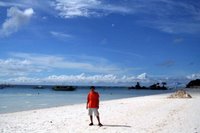 Walking back finally to the hotel with Paolo, I told him, grabe, ganito pala sa Boracay: hindi pa ako nakaka-alis, I’m already thinking of what I’m going to do when I get back.
Walking back finally to the hotel with Paolo, I told him, grabe, ganito pala sa Boracay: hindi pa ako nakaka-alis, I’m already thinking of what I’m going to do when I get back.
Paolo replies: well, that’s Boracay for you. I remembered a text message that a friend sent me the night before: Now you know what true love feels like. It’s what you feel when you’re in Boracay.
Not quite, I thought. But maybe it comes close.
I left quietly, leaving Paolo, Kristine and Jason to their own devises. I boarded the hotel shuttle to the Station Two boat port, and, with my bags— now bulging from the pasalubong I bought— I boarded the ferry back to the Caticlan, taking a parting shot of the island.

The five days had passed so quickly, I thought, and I decided: it was one of the best and more restful vacations I had ever had.
I reached the airport without much hassle, and after checking-in my bag, I waited at the pre-departure area, listening to the IPod, and looking out the large, glass-paneled windows onto the run-way, with nary a thought in my head. The same mental vacuity punctuated the plane ride home, in a turboprop plane, much larger than what I had ridden on the way to the Island.
I sat next to the plane’s emergency exit, the flight stewardess asking me whether I was prepared to assist in the evacuation of the aircraft in case of an emergency landing. What a comforting thought, I told myself, as I eased into my seat, and quickly lost myself in the drone of the propellers and the music from the IPod, somewhat impatient to get home. It turned out to be an hour-long flight, longer than the journey out to the island.
I do not remember much about what happened during the flight back to Manila, or landing at the airport an hour later, or being picked up by my mom at the airport, because there was no longer any reason to remember. It was back to reality for me, I thought: back to the pressures of the rest of my life, and striving to be happy. But I wanted to prolong the opiate a little longer, and entering my room after five days and four nights away, I found that the only thought in my head was: the best thing about going away was coming home.
